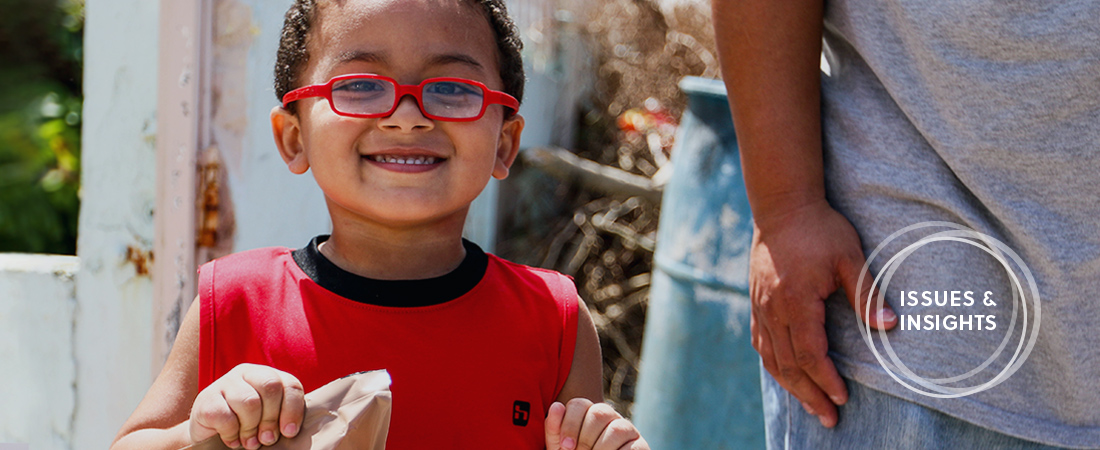Puerto Rico and the USVI: Head Start after the Hurricanes

Before Hurricanes Maria and Irma swept through Puerto Rico and the U.S. Virgin Islands (USVI) last fall, Head Start programs served more than 35,000 children and their families, playing an essential role in preparing some of the islands’ most vulnerable children for success in school and in life.
Now, few of these centers are operational, and even those that are have suffered damage and other setbacks.
Restoring Head Start centers so they can again provide vital services is just one of many significant challenges facing Puerto Rico and the USVI. EDC’s Nancy Topping-Tailby recently traveled to San Juan, Puerto Rico, to participate in a training for Head Start grantees and local officials hosted by the Administration for Children and Families and the Office of Head Start. Here, she reports on what she learned.
Q: Head Start services in Puerto Rico and the U.S. Virgin Islands were severely affected by the hurricanes. What challenges are they now facing?
Topping-Tailby: As of mid-December, approximately half of the centers in Puerto Rico were closed, preventing the delivery of Head Start health, dental, and nutrition services to infants, toddlers, and preschool children. In the Virgin Islands, three-quarters of the Head Start centers remain closed.
The Head Start grantees that I talked to told me that several centers are completely destroyed; others are heavily damaged. Transportation issues and a lack of electricity are impeding services. I also heard stories from several grantees who tried to reopen in other locations only to encounter landlords who are now charging sky-high rents for their property.
No power also means no Internet. This makes sharing documents and information difficult. When I flew down for the training, I brought 170 pounds of documents, forms, and information in English and Spanish that Head Start staff could no longer access. It totaled over 10,000 pieces of paper.
It’s also important to note that Head Start staff have been profoundly affected, too. These teachers and administrators are trying to help the families they serve, and yet they are also dealing with the same issues of loss, grief, and an uncertain future.
Q: Why is it so important to get Head Start centers up and running again?
Topping-Tailby: Head Start delivers comprehensive services that families need right now, such as high-quality childcare and family support in the form of health services for children and social services for parents. All of these services are critical now when family stress is very high.
We need to get children back into stable, educational settings. We need to help their parents pick up the pieces, too. I think it’s fair to say that the longer Head Start centers remain closed, the longer the recovery will be, both for the island and the families served by Head Start.
Q: What other concerns did you hear about?
Topping-Tailby: Many mental health workers are concerned that substance abuse and suicide will increase. There’s also worry about the future. Two hundred thousand people have left the island—including young professionals, business owners, and families. And there’s a fear that the next generation of Puerto Ricans—the people who could help the island recover—are not coming back. That has generated a profound sense of loss.
Q: Is there any good news?
Topping-Tailby: Yes. Head Start staff have shown themselves to be incredibly dedicated to the children and families of Puerto Rico and have demonstrated a lot of resilience in the face of such adversity. Some programs are open on a partial basis, but they can only serve children three hours a day because they have no running water or electricity. Other centers are also starting to offer alternative services, like home visiting, where Head Start staff conduct home visits with families in their homes and local shelters. Program staff are looking for ways to create a sense of normalcy and stability.
Another piece of encouraging news from the meeting was that officials from the Office of Head Start and the Administration for Children and Families kept saying that they were committed to Puerto Rico and the Virgin Islands for the long haul. They believe that the islands will recover. They will be different, but stronger, than before.
Q: What lessons can we learn from what is happening now?
Topping-Tailby: Hurricanes Maria and Irma showed us that early childhood programs need to be prepared for natural disasters and their aftermath. At the training I attended, Head Start staff and mental health consultants were learning to deliver psychological first aid—a trauma recovery response curriculum—and they were also trying to resolve a lot of logistical challenges too. The core question seemed to be, how do you deliver effective support for families after a major traumatic event, such as a massive fire, hurricane, or tornado?
My project, the National Center on Early Childhood Health and Wellness, is putting together information to help Head Start and child-care centers prepare for and respond successfully to natural disasters. We are seeing natural disasters occurring with increasing frequency. Disaster recovery is a topic that needs to be on everyone’s radar.

